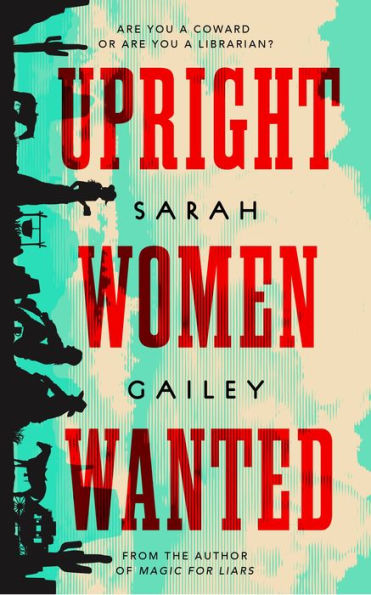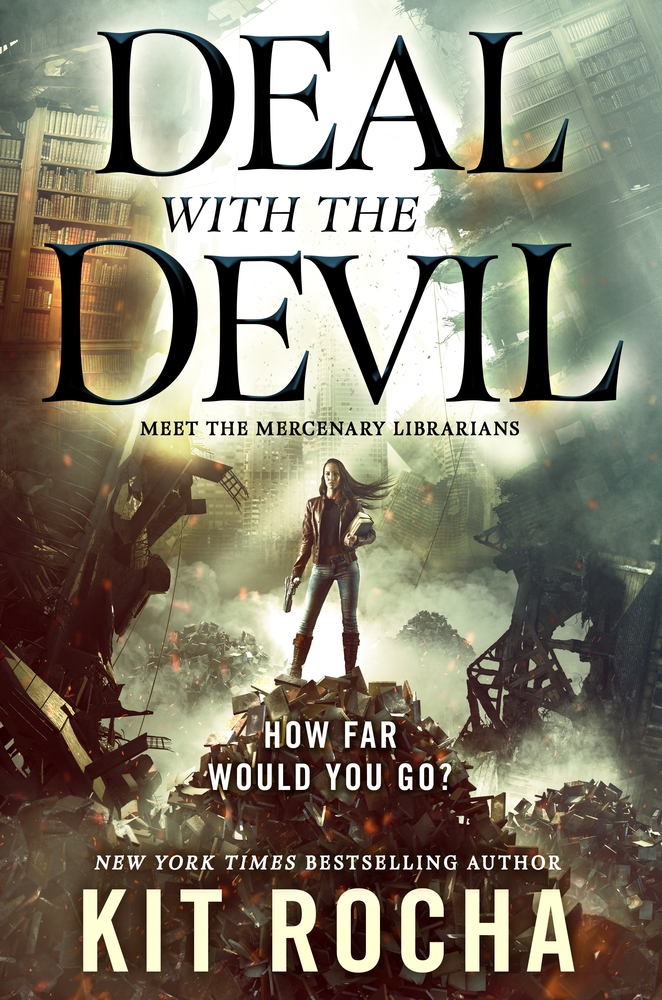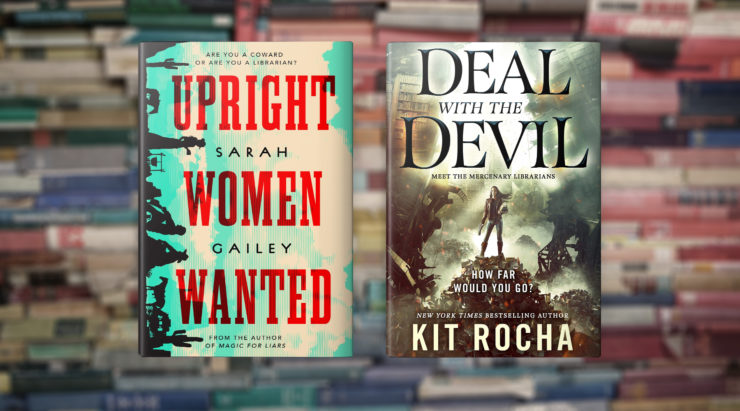The heroes of the near future, of worlds starved for knowledge and restricted by authoritarian regimes, are genetically-engineered soldiers and six-shooter-toting horseback riders. They know how to cross unforgiving deserts teeming with poisonous snakes and vicious bandits, how to calculate the most brutally efficient combination of moves to neatly dispatch their enemies before they’ve even landed the first blow. And they’ll do it all with their most treasured tool in their hands or on their backs: a book.
Because they’re librarians. Every single one of them. Because the only people who are going to save our future are the ones who still know what the truth is, and who are willing to bring it to the people who need it most.
In an intriguing bit of synergy, 2020 is shaping up to be the year of the librarian. Sarah Gailey’s Upright Women Wanted stows away with the Librarians, a cabal of female and nonbinary folks who cross through a future that has reverted to its Wild West roots, on a mission to deliver the State’s Approved Materials to those in need of knowledge and entertainment. In a similarly dystopian reality, but with a more explicitly science fiction bent, Kit Rocha’s Mercenary Librarians make a Deal with the Devil in order to recover a time capsule filled with lost files from the Rogue Library of Congress.
Buy the Book


Upright Women Wanted
Despite their different settings, both futures are extrapolations of our present, in which some national or global event cuts off the common person’s connections to the outside world, narrowing their scope and creating conditions under which ideals and empathy are sacrificed for the sake of self-preservation. Chafing beneath the State’s sinister simplification, or TechCorps’ economic stranglehold, survivors can see no further than making it to the next day. The existence of people who don’t conform to the idea of mainstream (cisgender, heterosexual, binary) identity are written out of reality, excised from the narrative. The truth—the fact that these are real, flesh-and-blood figures with voices of their own—is no longer regarded as an objective reality. The truth becomes a luxury that people can no longer afford to uphold or seek out. It is in danger of being erased entirely, a lost relic of the past.
Except for those who know how to read between the lines.
Like Esther, who tries to lie her way into the Honorable Brigade of Morally Upright Women, doing Rewarding Work Supporting a Bright Future for the Nation’s Children. Initially it’s because she thinks she can hide all of the parts of herself that make her a danger to the State, believing that she can pluck out every impulse that makes her special, like tearing pages from a censored book. But instead of losing herself in some form of State-approved sisterhood, some literary nunnery, Esther discovers the real reasons behind why the Librarians put themselves through danger, and the significance of what they deliver via their mobile library. Her Wild West apprenticeship uncovers a truth that is greater even than the temptation of safety.
Like Nina, who recreates the “third place” that libraries have always occupied between the home and the office: a community space, where children can delight in weekly movie nights and adults can trade freeze-dried foods for other resources. Even in the shadow of an omnipotent corporation that sets the lower classes fighting amongst themselves for scraps, Nina and her fellow Mercenary Librarians enact the most radical form of protest: They give away knowledge freely, printing books and sharing digital files instead of hoarding or demanding money that people don’t have. They re-expand people’s worlds.
In some ways, Nina and Esther are simply the latest members of a long-running club, their stories new entries into an established canon. After all, SFF has long loved and revered a good librarian: a champion of the written word, an ersatz historian or archivist bringing order to Hellmouths and doomed planets. Whether they’re traveling through L-space or sorting through every potential manuscript ever dreamt of, a librarian embodies the best of the genre’s readers: delightfully bookish, and not only fiercely protective of intellectual freedom, but passionate about preserving access to information and ideas. More than once, the fate of humanity has hinged on a librarian’s vast and wise perspective of whether people have learned all they can, or if they have more learning left to do.
However, the timing of these particular librarians’ arrival is no accident. Like any good librarian, the universe has delivered these books to us when we need them the most…
…When more people visited the local library than the movie theater in 2019, yet there are still ongoing debates over whether these spaces are relevant enough to deserve continued funding.
…When book banning bills would imprison librarians for handing out queer stories or books about sexual assault.
…When librarians in high-traffic drug-use communities act as first responders in the opioid crisis, saving the lives of those who overdose inside their walls.
…When young, queer, people of color are challenging outdated stereotypes of what makes a “real” librarian and arguing that librarians can no longer be neutral figures—not when objective facts and knowledge are being overshadowed by hateful and damaging biases.
Buy the Book


Deal With the Devil
In 2014, photographer Kyle Cassidy took portraits of attendees at the American Library Association’s Midwinter Meeting in order to show that the stewards of books are as unique as the texts that they protect and pass on. In the same vein, Rocha and Gailey’s books will hopefully usher in even more SFF librarians, each operating within their own singular context: near-future sci-fi romance where the librarians get to tangle with hot bioengineered Silver Devils, or Wild West adventure brimming with queer love and community on the horizon—or perhaps an entirely different subgenre for librarians to inhabit.
Filling so many vital roles is asking a hell of a lot—especially for librarians-turned-first-responders like Chera Kowalski from the McPherson Square branch of the Free Library of Philadelphia. When the Philadelphia Inquirer published its 2017 piece about librarians like Kowalski being trained to administer Narcan to people overdosing in or near their library, she became the face of this growing movement. Named one of Library Journal’s 2018 Movers & Shakers, Kowalski maintains that despite this particularly extreme mission creep, she is still doing her job:
“Public libraries respond to the needs of their communities,” she said in a 2017 TEDMED talk, “and not knowing how to utilize Narcan was a disservice to the needs of our community.” Emphasizing that the opioid epidemic impacts the entire community, she went on to say that “we will continue to do what we can with the resources we have and we will continue to provide whatever help we can in hopes of keeping our community safe and healthy, because public libraries have always been more than just books. We are physical shelter, a classroom, a safe haven, a lunch room, a resource hub, and, yes, even a lifeline.”
Badass librarians aren’t just our future—they’re the unsung heroes of our present.
Upright Women Wanted is available February 4 from Tor.com Publishing.
Deal with the Devil is available May 12 from Tor Books.
Natalie Zutter has a traveling librarian in her own post-apocalyptic audio drama… imagine that. Tell her about your favorite librarian (fictional or real!) on Twitter.











“Badass librarians aren’t just our future—they’re the unsung heroes of our present…” – unless you are a fan of Sanderson’s Alcatraz series. LOL..
Thanks! It’s great that you love us. We love your books.
Now, could the head honchos at Macmillan discontinue the e-book embargo? It’s hurting business on both ends.